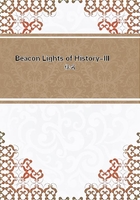
第69章
These lordly proprietors of great estates,--or nobles,--so powerful and independent, lived in castles. These strongholds were necessary in such turbulent times. They were large or small, according to the wealth or rank of the nobles who occupied them, but of no architectural beauty. They were fortresses, generally built on hills, or cragged rocks, or in inaccessible marshes, or on islands in rivers,--anywhere where defence was easiest. The nobles did not think of beautiful situations, or fruitful meadows, so much as of the safety and independence of the feudal family. They therefore lived in great isolation, travelling but little, and only at short distances (it was the higher clergy only who travelled).
Though born to rank and power, they were yet rude, rough, unpolished. They were warriors. They fought on horseback, covered with defensive armor. They were greedy and quarrelsome, and hence were engaged in perpetual strife,--in the assault on castles and devastation of lands. These castles were generally gloomy, heavy, and uncomfortable, yet were very numerous in the eleventh and twelfth centuries. They were occupied by the feudal family, perhaps the chaplain, strangers of rank, bards, minstrels, and servants, who lived on the best the country afforded, but without the luxuries of our times. They lived better than the monks, as they had no vows to restrain them. But in their dreary castles the rooms were necessarily small, dark, and damp, except the banqueting hall. They were poorly lighted, there being no glass in the narrow windows, nor chimneys, nor carpets, nor mirrors, nor luxurious furniture, nor crockery, nor glassware, nor stoves, nor the refinements of cookery. The few roads of the country were travelled only by horsemen, or people on foot. There were no carriages, only a few heavy lumbering wagons. Tea and coffee were unknown, as also tropical fruits and some of our best vegetables.
But game of all kinds was plenty and cheap; so also were wine and beer, and beef and mutton, and pork and poultry. The feudal family was illiterate, and read but few books. The chief pleasures were those of the chase,--hunting and hawking,--and intemperate feasts.
What we call "society" was impossible, although the barons may have exchanged visits with each other. They rarely visited cities, which at that time were small and uninteresting. The lordly proprietor of ten thousand acres may have been jolly, frank, and convivial, but he was still rough, and had little to say on matters of great interests. Circumscribed he was of necessity, ignorant and prejudiced. Conscious of power, however, he was proud and insolent to inferiors. He was merely a physical man,--ruddy, healthy, strong indeed, but without refinement, or knowledge, or social graces. His castle was a fort and not a palace; and here he lived with boisterous or sullen companions, as rough and ignorant as himself. His wife and daughters were more interesting, but without those attainments which grace and adorn society. They made tapestries and embroideries, and rode horseback, and danced well, and were virtuous; but were primitive, uneducated, and supercilious. Their beauty was of the ruddy sort,--physical, but genial. They were very fond of ornaments and gay dresses; and so were their lords on festive occasions, for semi-barbarism delights in what is showy and glittering,--purple, and feathers, and trinkets.